The Three Wishes
Grade 2
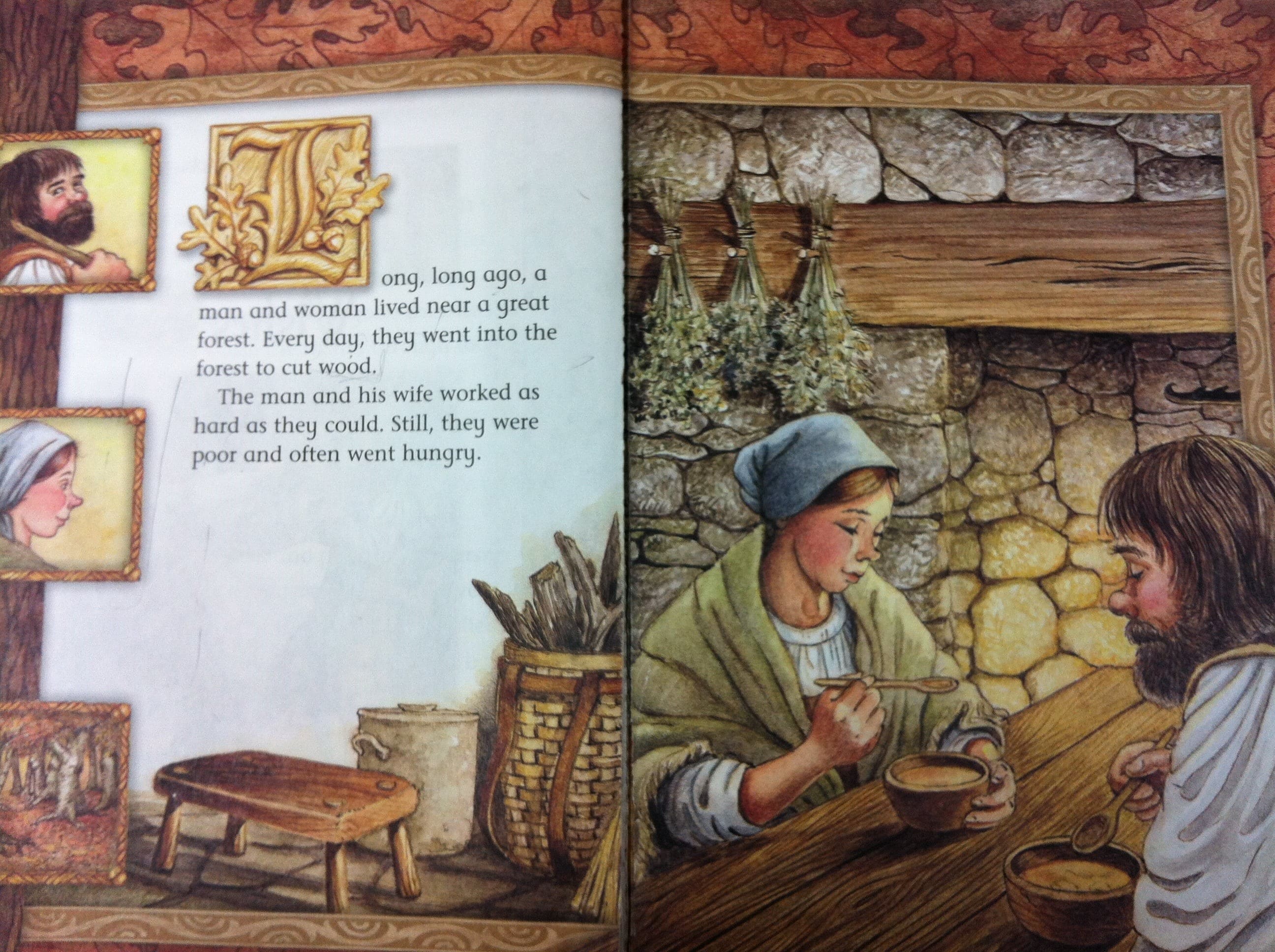
Long, long ago, a man and a woman lived near a great forest.
- 아래 표기가 옳은지 확인하세요.
-
8 page (O/X), 8 pages (O/X), bus 8 (O/X),
Bus 8 (O/X), 8 buses (O/X), 2반 = class 2 (O/X),
2 class (O/X), 2 classes (O/X), Classes 2 (O/X), 2반들 = 2 classes (O/X)
I waited for bus 8 for 20 minutes ~. (O/X)
I am in class 2 ~. (O/X) - 문장 만들기
- Imagine you live in a world with only 20 words! Write a paragraph (at least 5 sentences) using only your 20 chosen words.
-
In a cave lived a cake! The cake was called Make. Make loved making things. Make made a chicken. Make helplessly died one year after Make made the chicken. (초등학교 3학년의 글)
- The ___________
The는 항상 명사와 짝입니다. 그래서 the를 보는 순간 뜻과 함께 뒤에 올 명사를 기대해야 합니다. '안다'는 뜻인데, 한국어로 표현하면 '그' 정도 됩니다. 예를 들면, the cat은 '내가 아는 = 그' 고양이.
- 명사 = 이름 (사람, 물건, 장소)
규칙: 명사를 사용할 때마다 반드시 하나인지 여러 개인지를 밝혀야 한다.
위 규칙을 적용해서 고양이가 한 마리인 것을 7가지 방법으로 나타내세요.
위 규칙을 적용해서 고양이가 여러 마리인 것을 7가지 방법으로 나타내세요.
a cat, one cat은 글자가 다르기 때문에 사용 방법도 다릅니다. 어떻게 다를까요?
- 문장 속에서도 I는 항상 대문자입니다. 이유는?
- 대문자는 어떤 경우에 사용할 수 있죠? 4가지만 말해보세요.
위 문장에서 가장 중요한 부분에 표시하세요.
주어는?
동사는?
units of time = {..., second, minute, hour, day, week, fortnight, month, quarter, season, semester, year, decade, century, millennium, ...}
months = {January, ____________________, December}
days = {Sunday, Monday, ____________________, Saturday}
a second ago < a minute ago < an hour ago < two hours ago < a month ago < a year ago < … < long ago < long, long ago < once upon a time, ...
문장 만들기
The 21st century began on January 1, 2001, and will end on December 31, 2100. It is the first century of the 3rd millennium.
2019년 = ______________ 2019
Ordinal Numbers
- first, 1st
- second, 2nd
- third, 3rd
- fourth, 4th
- __________, 5th
- sixth, 6th
- seventh, 7th
- eighth, 8th
- __________, 9th
- tenth, 10th
- __________
- __________
- thirteenth
- ...
- 20번째: ___________
- 40번째: ___________
- 100번째: ___________
- 101번째: ___________
hyphen(-)은 여러 단어를 이어서 하나의 단어를 만들 때 사용합니다.
56,123,123,456,789
- 숫자 속에 있는 comma(,)는 특별한 이름이 있어요.
- 6,789 thousand
- 23,456,789 million
- 3,123,456,789 billion
- 56,123,123,456,789 trillion
Order
- in order
- in ABC order
- in ascending order
- in descending order
-
- ascend
- descend
- out of order
-
- This elevator is out of order.
문장 만들기
위 문장의 a man and a woman을 the man and his wife로 바꿔도 될까요?
위 문장의 a man and a woman을 one man and one wife로 바꾸면 뜻이 달라집니다. 설명해보세요.
위 문장의 a man and a woman을 they로 바꾸면 안됩니다. 이유는?
- 글의 첫 문장이 he, she, 또는 they 같은 대명사로 시작하면 안 됩니다. 이유는?
- (이 동화 The Three Wishes의 4번째 문장을 읽으면, 답을 알 수 있습니다.)
조금 어려운 내용
- lived가 과거입니다. 1분 전도 과거이고, 100년 전도 과거이고, 1,000년 전도 과거입니다. 그럼 had pp(대과거)는 어떤 경우에 사용합니까?
- 위 문장의 lived를 had lived로 바꿔도 되나요?
live (v.) – life (n.) – alive (adj.) / live (adj.)
- She is still alive.
- This is a live broadcast.
- life + life + … = lifes (X) _______________ (O)
Near와 close의 뜻을 아래 표현을 통해 찾아내세요.
- A tiger is near.
- A tiger is near me.
- The library is near to my school.
- 현수 is close.
- 현수 is close to me.
- 현수 closed the door behind him.
close의 발음 2가지
- 현수 closed the door behind him. [z]
- 현수 is close to me. [s]
서연's (2)
leave (v. - 2): _________________, __________________
- ee, ea – 길게 발음, i – 짧게 발음
- leave – left – left
- (1) 떠나다
- (2) 남기다
- I left a message for my mom.
- leaves (n.): ________________ = leaf + leaf + …
-
-
many water (O/X), much water (O/X),
many money (O/X), much money (O/X),
lots of water (O/X), a lot of water (O/X),
lots of money (O/X), a lot of money (O/X),
many books (O/X), much books (O/X),
lots of books (O/X), a lot of books (O/X),
many bottle (O/X), many bottles (O/X), much bottle (O/X), much bottles (O/X),
lots of bottle (O/X), lots of bottles (O/X), a lot of bottle (O/X), a lot of bottles (O/X) - a lot of candy >>>>>>>> a lot of candies >>> many candy > many candies
before와 ago는 단어가 다르기 때문에 뜻도 다릅니다. 어떻게 다르죠?
after의 뜻?
글을 쓸 때, 0~10까지는 글자로 써야 합니다.
산수(arithmetic)와 수학(mathematics = math = maths)의 차이점은?
단어 몇 개 더
- beside: 민혁 is beside me.
- besides: Besides, he's far too young to think of getting married.
- besides N: Nothing besides a miracle could help them. (m-w.com)
- except N: No one except 영민 could finish the dessert.
- except for N: (1) Except for you, I would be dead. (2) Everyone was gone except for me. (m-w.com)
문장 만들기
- That door before you was opened two centuries ago by someone named Goliath. (O/X)
-
a wood, woods, forest의 차이점은?
wood, timber, tree의 차이점은?
Every day, they went into the forest to cut wood.
Every day 뒤에 있는 comma(,)의 정체는?
Every와 all의 차이점은?
아래 문장의 뜻은?
- All the apples in this bucket is/are rotten.
- All I have is/are yours.
all, every, both, always, ...에 not이 더해지면, 뜻이 좀 달라집니다. 아래 문장의 뜻은?
- All that glitters is not gold.
- Both you and I are not tall.
- Being accurate is not always smart.
대명사란?
위 문장에서 they를 a man and a woman으로 바꿔도 되나요?
영어는 반복하는 것을 몹시 싫어하는 언어입니다. 그래서 대명사와 synonym이 발달해있습니다.
매년 수능에 대명사 문제가 나옵니다. 이유는 무엇일까요?
대명사를 사용하기 위해서는 반드시 앞에 명사가 한번 언급되어야 합니다. 대명사를 사용해서 짧은 글을 만드세요.
a forest에서 the forest로 표현에 변화가 있습니다. 이유는 무엇입니까?
the forest 대신 a forest로 표현하면 뜻이 달라집니다. 어떻게 달라지는지 설명하세요.
into의 사용법 2가지를 찾아보세요.
- 동선 goes into my room. < 동선 enters my room. 배울 점은?
- 민호 divided the pizza into eight slices.
into를 사용해서 문장을 만들어보세요.
- She tied it into bundles and shook loose all the grain.
- The mill ground the grain into flour.
- _______________________.
- _______________________.
to 부정사란 무엇입니까?
- 문장에 동사를 하나 더 사용하는 방법입니다. (O/X)
- 쉽게 [to = 바로 뒤에 가짜 동사가 온다는 표시], [부정사 = 가짜 동사]입니다. (O/X)
진짜 동사와 가짜 동사를 구분하기 위해 모양을 다르게 합니다. 어떻게 다르죠?
가짜 동사 앞에 to가 있으면 to 부정사라 부르고, to가 없으면 원형 부정사라 부릅니다. 항상 to를 붙여서 사용해야 합니다. 그럼, 언제 to를 빼고 사용해야 할까요?
to 부정사는 보통 어떤 뜻을 만들기 위해 사용합니까?
to 부정사의 2번째 뜻은 정해져 있지 않지만, 누구나 보는 순간 또는 듣는 순간 바로 알 수 있습니다. 동의하십니까?
to 부정사를 사용하여 문장을 2개 만들어 보세요.
- 1번 뜻: __________________.
- 2번 뜻: __________________.
The man and his wife worked as hard as they could. Still, they were poor and often went hungry.
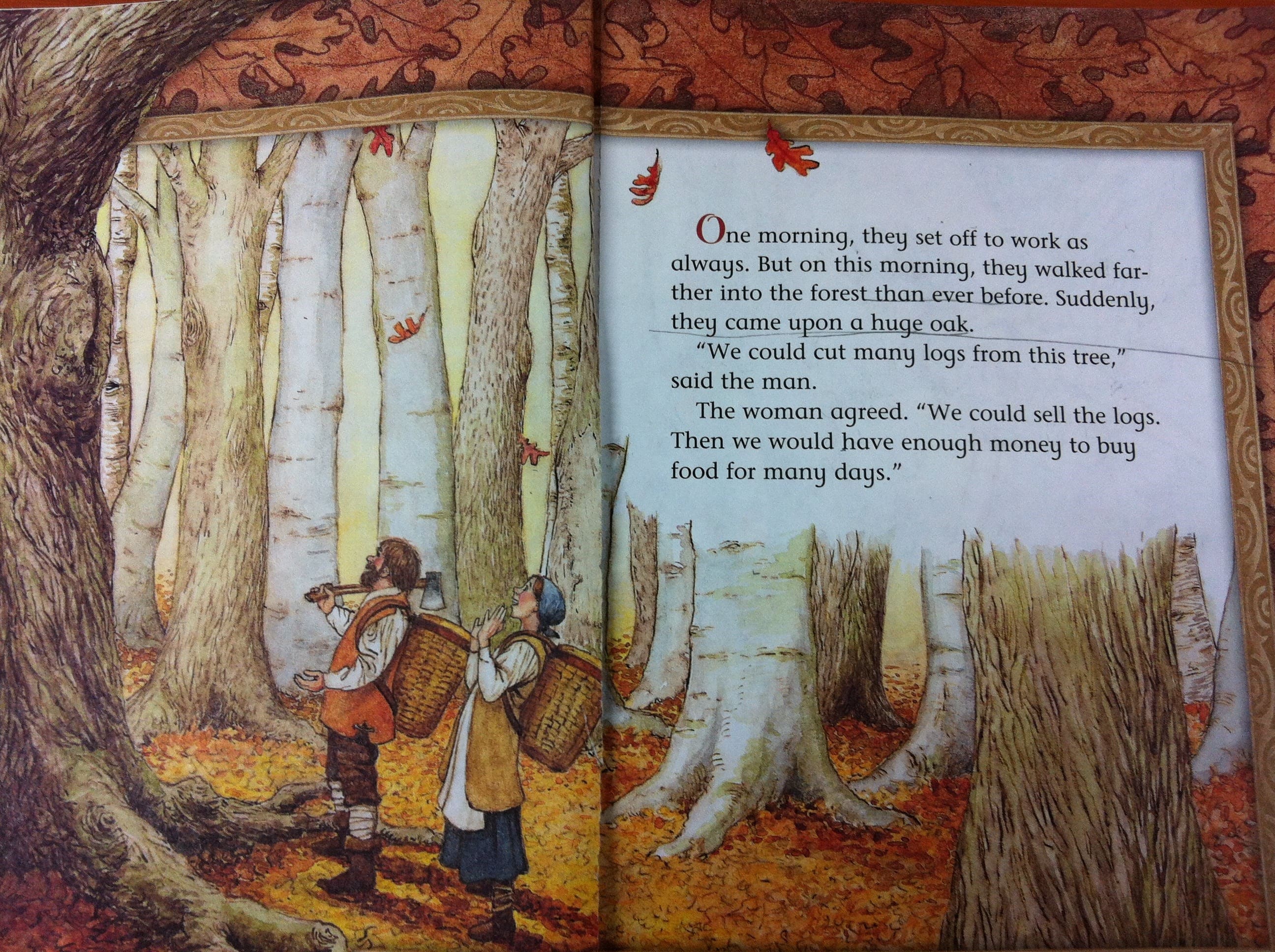
One morning, they set off to work as always. But on this morning, they walked farther into the forest than ever before. Suddenly, they came upon a huge oak.
“We could cut many logs from this tree,” said the man.
The woman agreed. “We could sell the logs. Then we would have enough money to buy food for many days.”
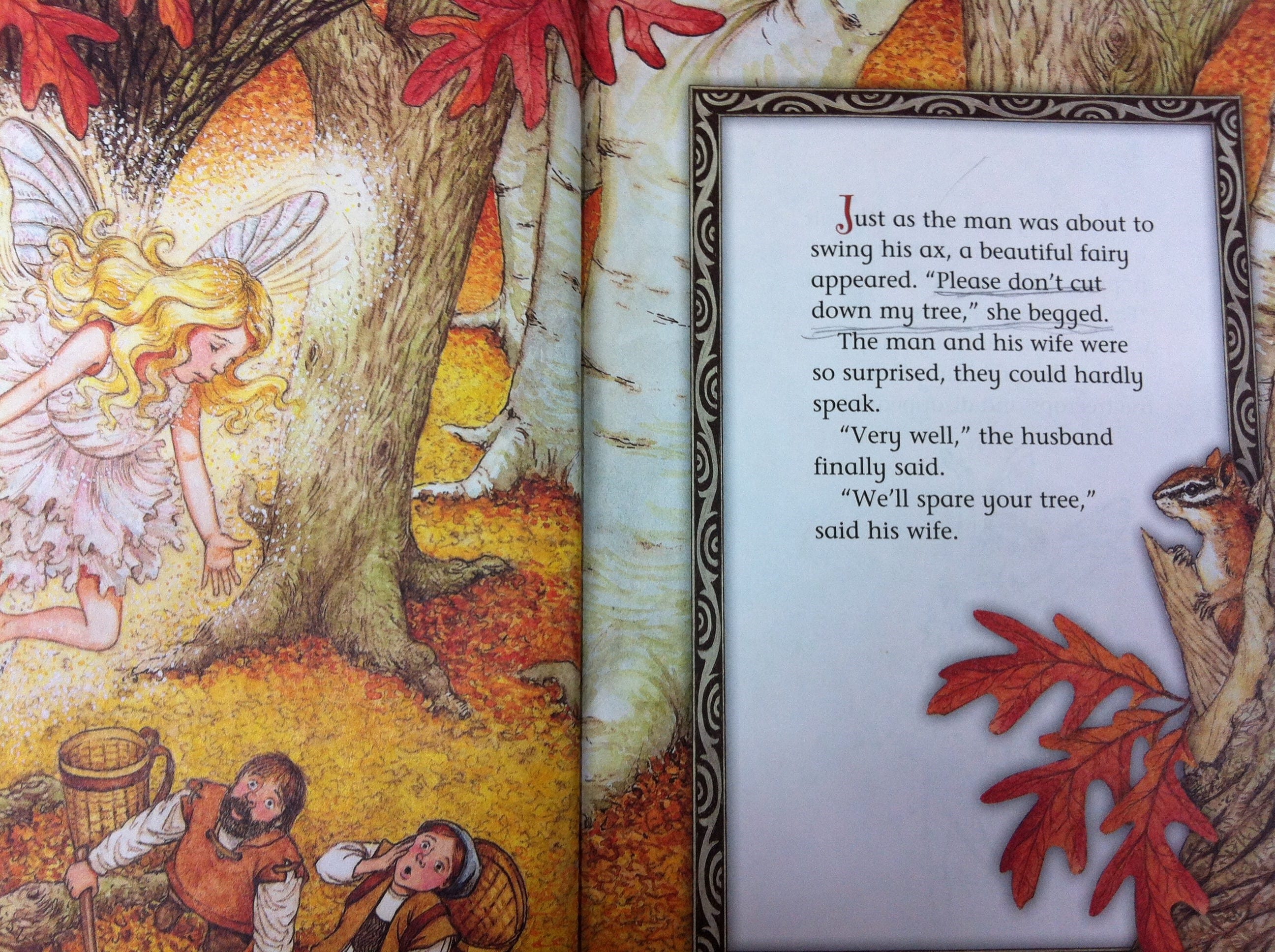
Just as the man was about to swing his ax, a beautiful fairy appeared. “Please don’t cut down my tree,” she begged.
The man and his wife were so surprised, they could hardly speak.
“Very well,” the husband finally said.
“We’ll spare your tree,” said his wife.
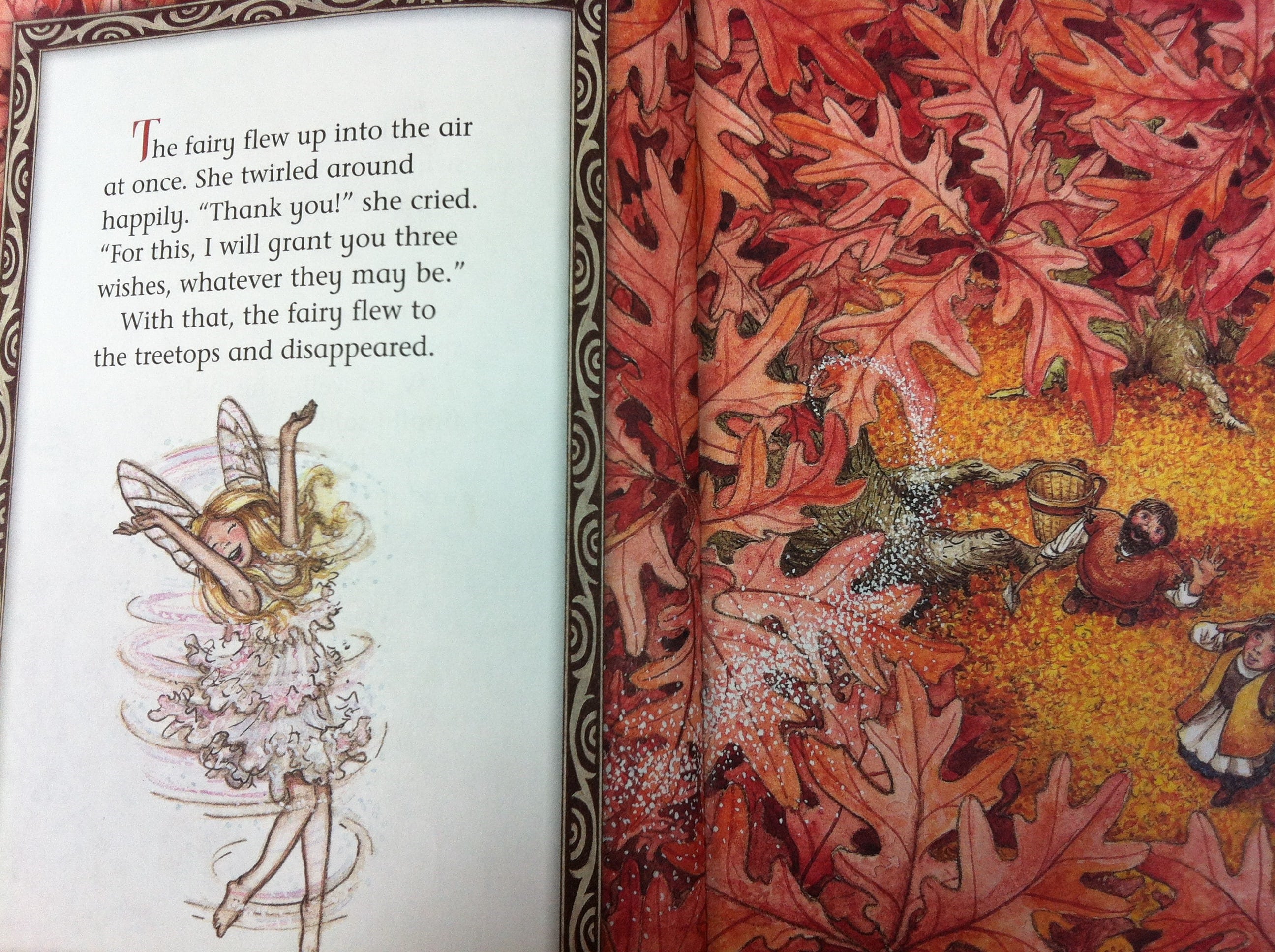
The fairy flew up into the air at once. She twirled around happily. “Thank you!” she cried. “For this, I will grant you three wishes, whatever they may be.”
With that, the fairy flew to the treetops and disappeared.
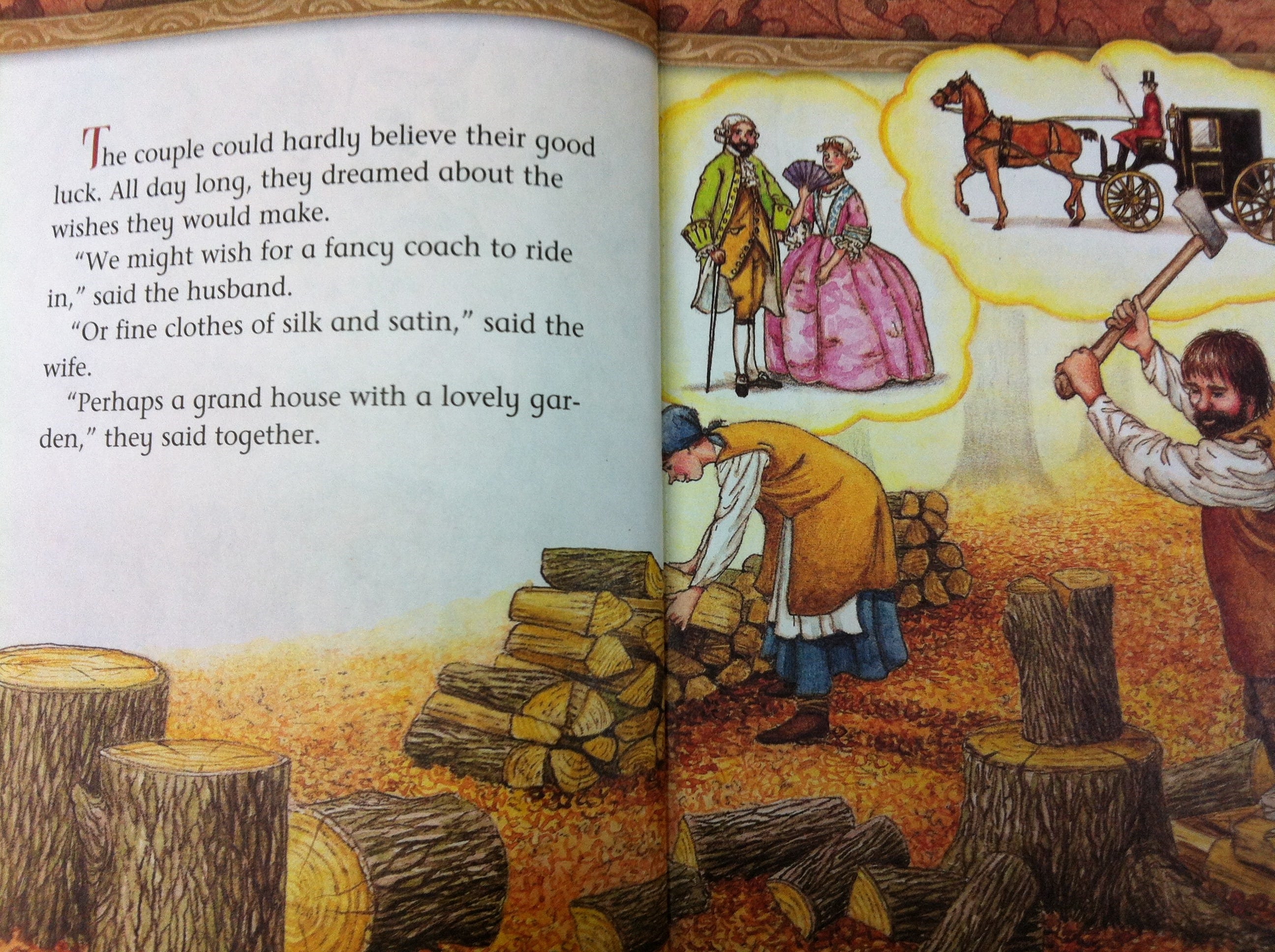
The couple could hardly believe their good luck. All day long, they dreamed about the wishes they would make.
“We might wish for a fancy coach to ride in,” said the husband.
“Or fine clothes of silk and satin,” said the wife.
“Perhaps a grand house with a lovely garden,” they said together.
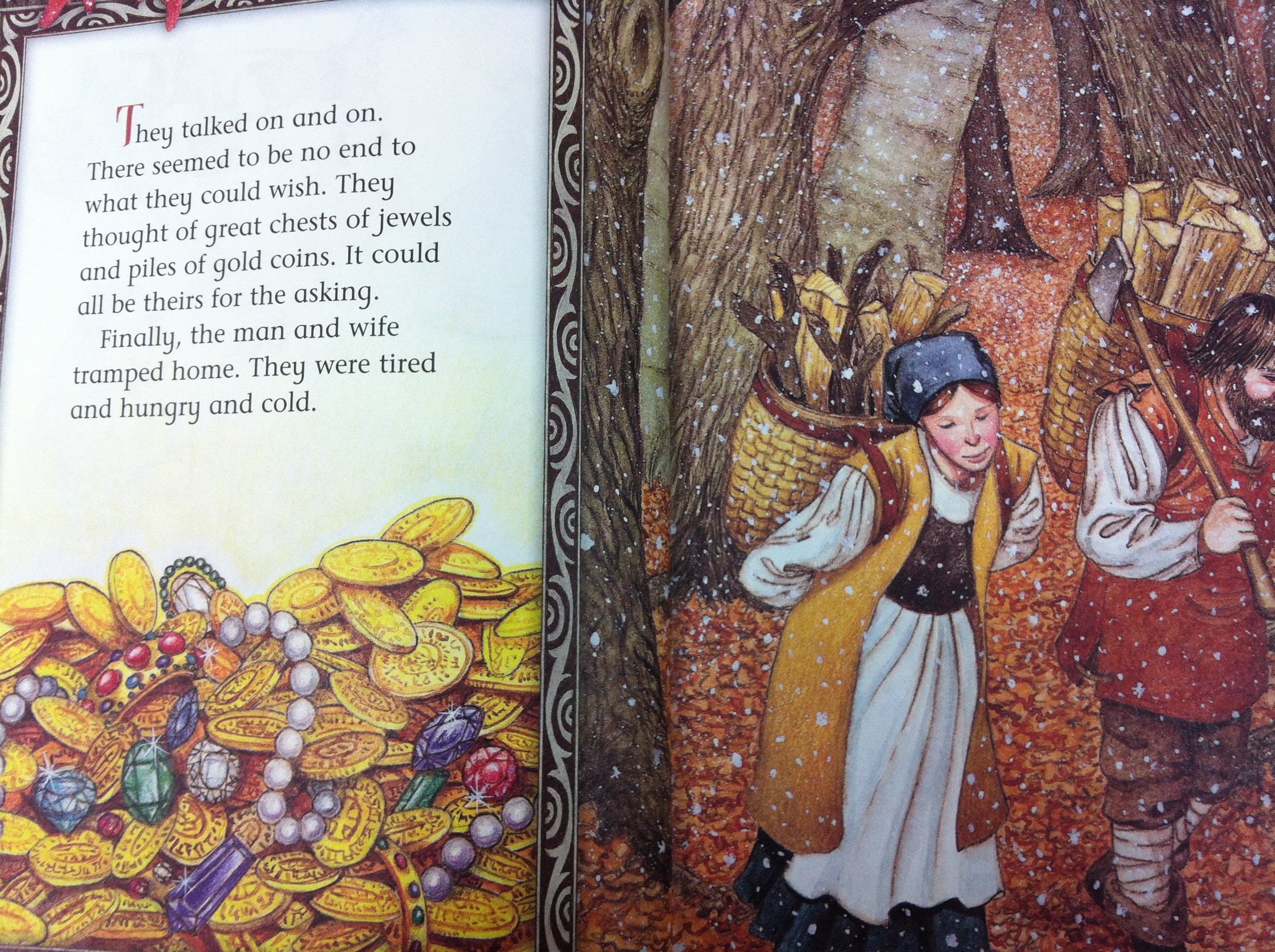
They talked on and on. There seemed to be no end to what they could wish. They thought of great chests of jewels and piles of gold coins. It could all be theirs for the asking.
Finally, the man and wife tramped home. They were tired and hungry and cold.
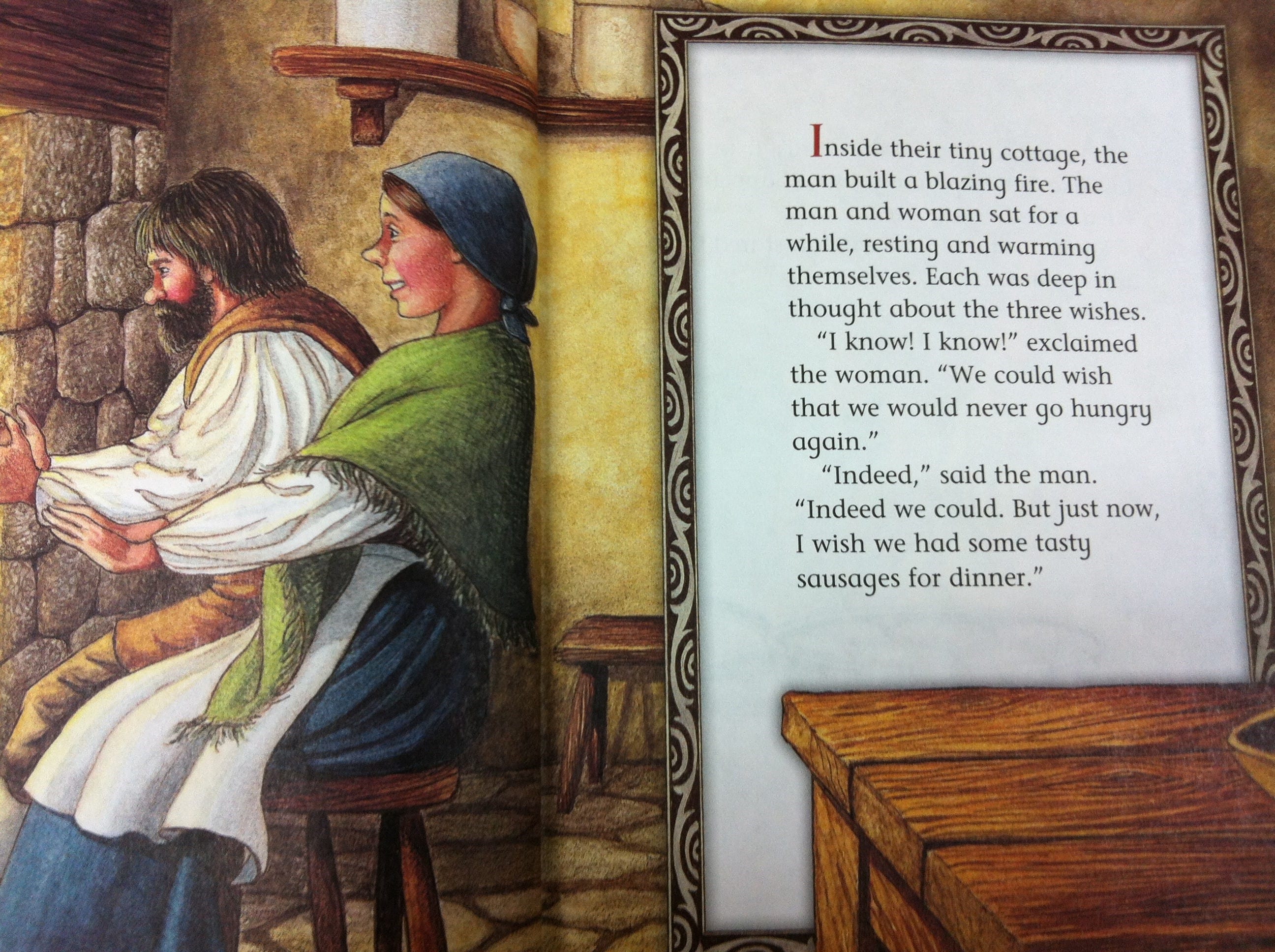
Inside their tiny cottage, the man built a blazing fire. The man and woman sat for a while, resting and warming themselves. Each was deep in thought about the three wishes.
“I know! I know!” exclaimed the woman. “We could wish that we would never go hungry again.”
“Indeed,” said the man. “Indeed we could. But just now, I wish we had some tasty sausages for dinner.”
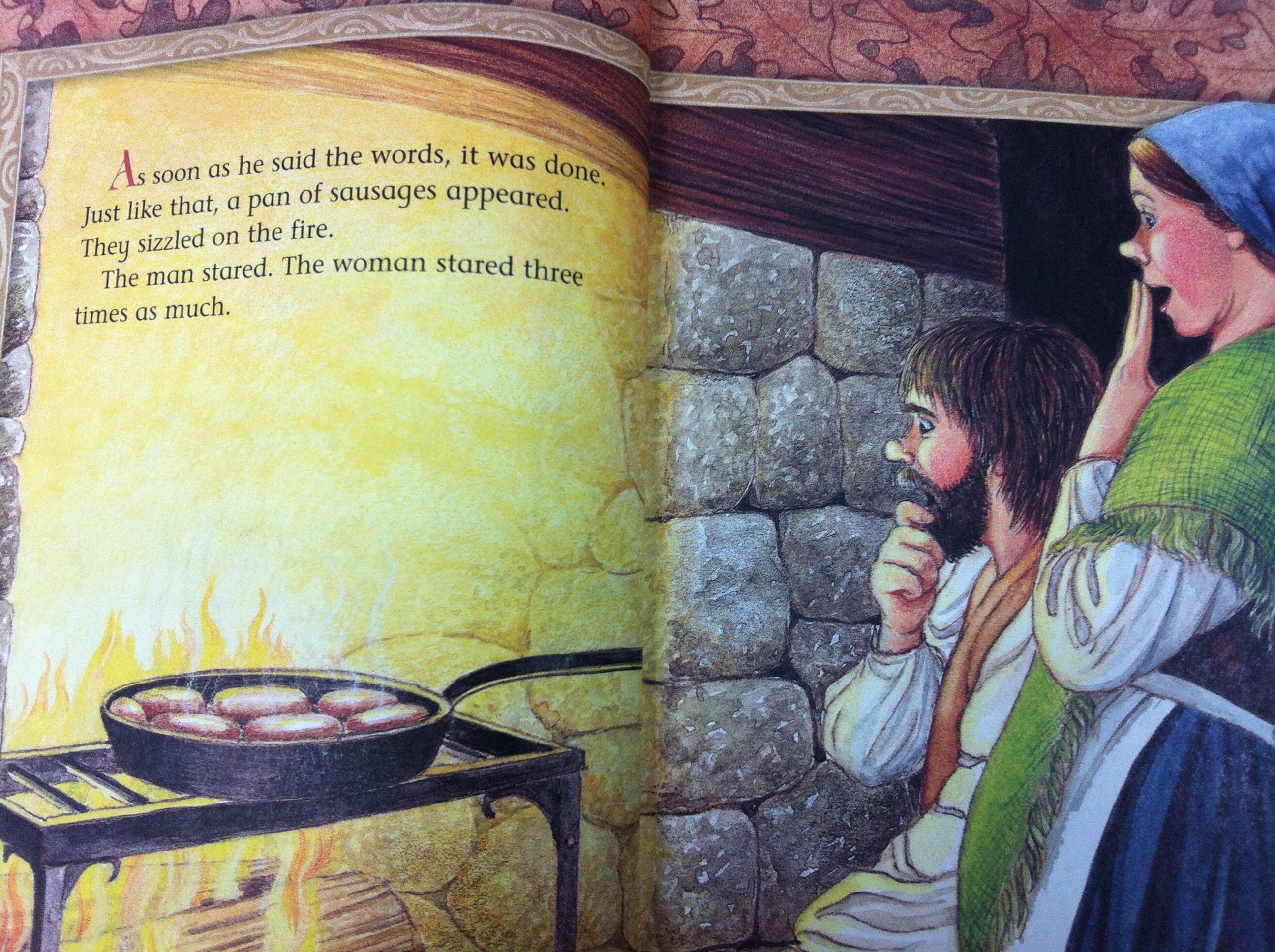
As soon as he said the words, it was done. Just like that, a pan of sausages appeared. They sizzled on the fire.
The man stared. The woman stared three times as much.

“That was a foolish thing to do!” the wife cried. “See what you’ve done! Why, I wish those sausages were hanging right from your nose!”
As soon she said the words, it was done. Just like that, the sausages hung straight from her husband’s nose.
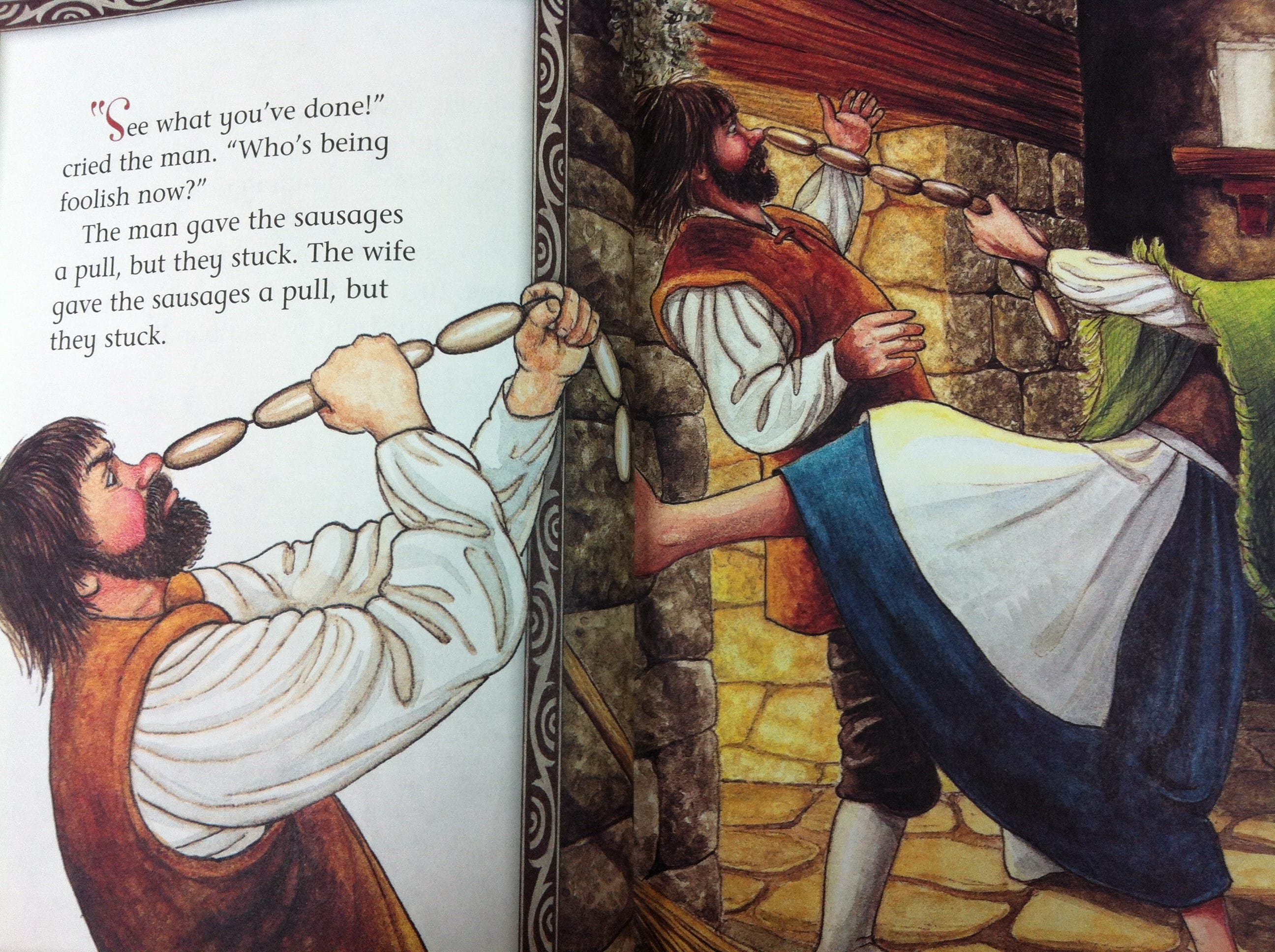
“See what you’ve done!” cried the man. “Who’s being foolish now?”
The man gave the sausages a pull, but they stuck. The wife gave the sausages a pull, but they stuck.
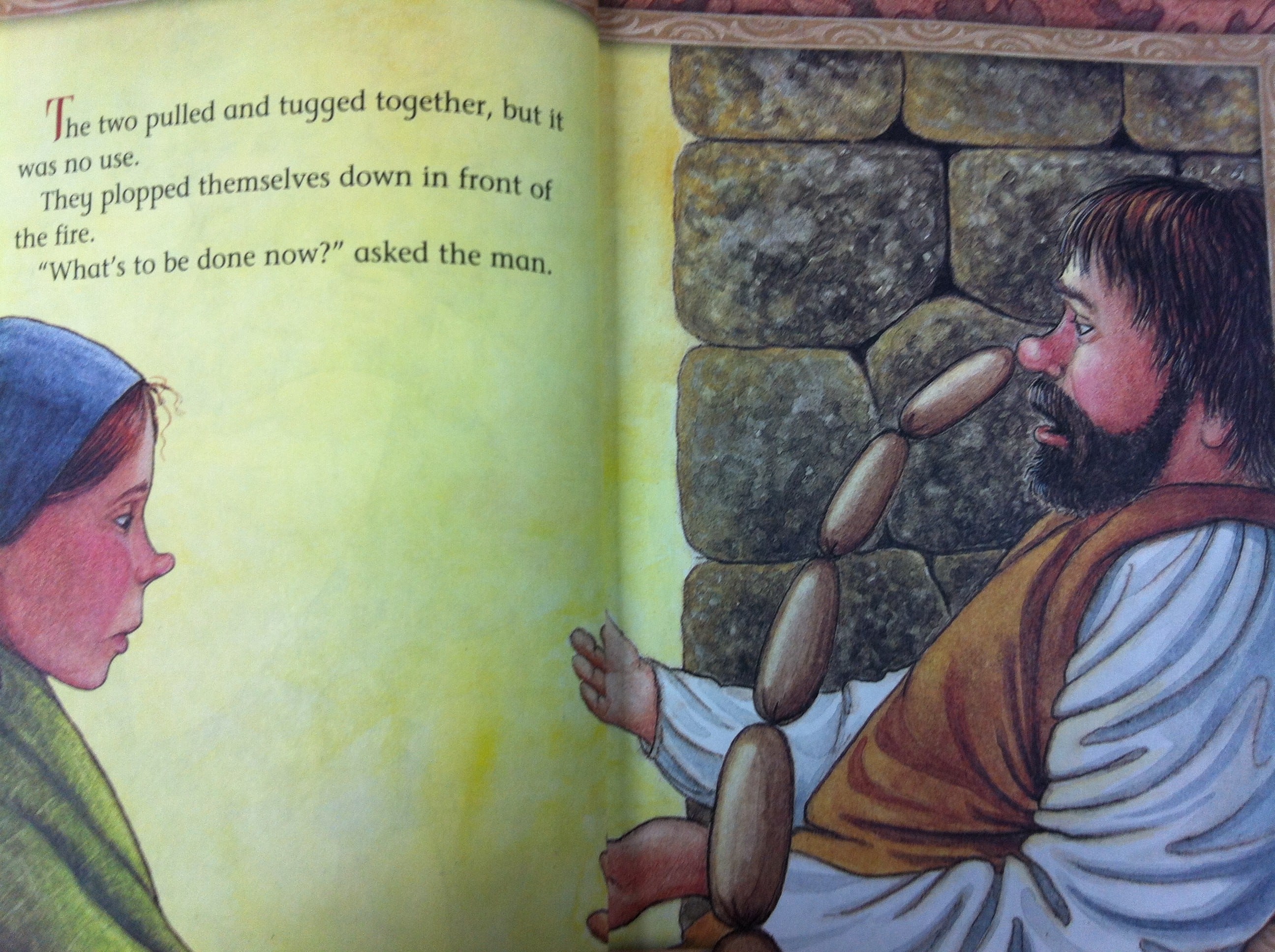
The two pulled and tugged together, but it was (of) no use.
They plopped themselves down in front of the fire.
“What’s to be done now?” asked the man.
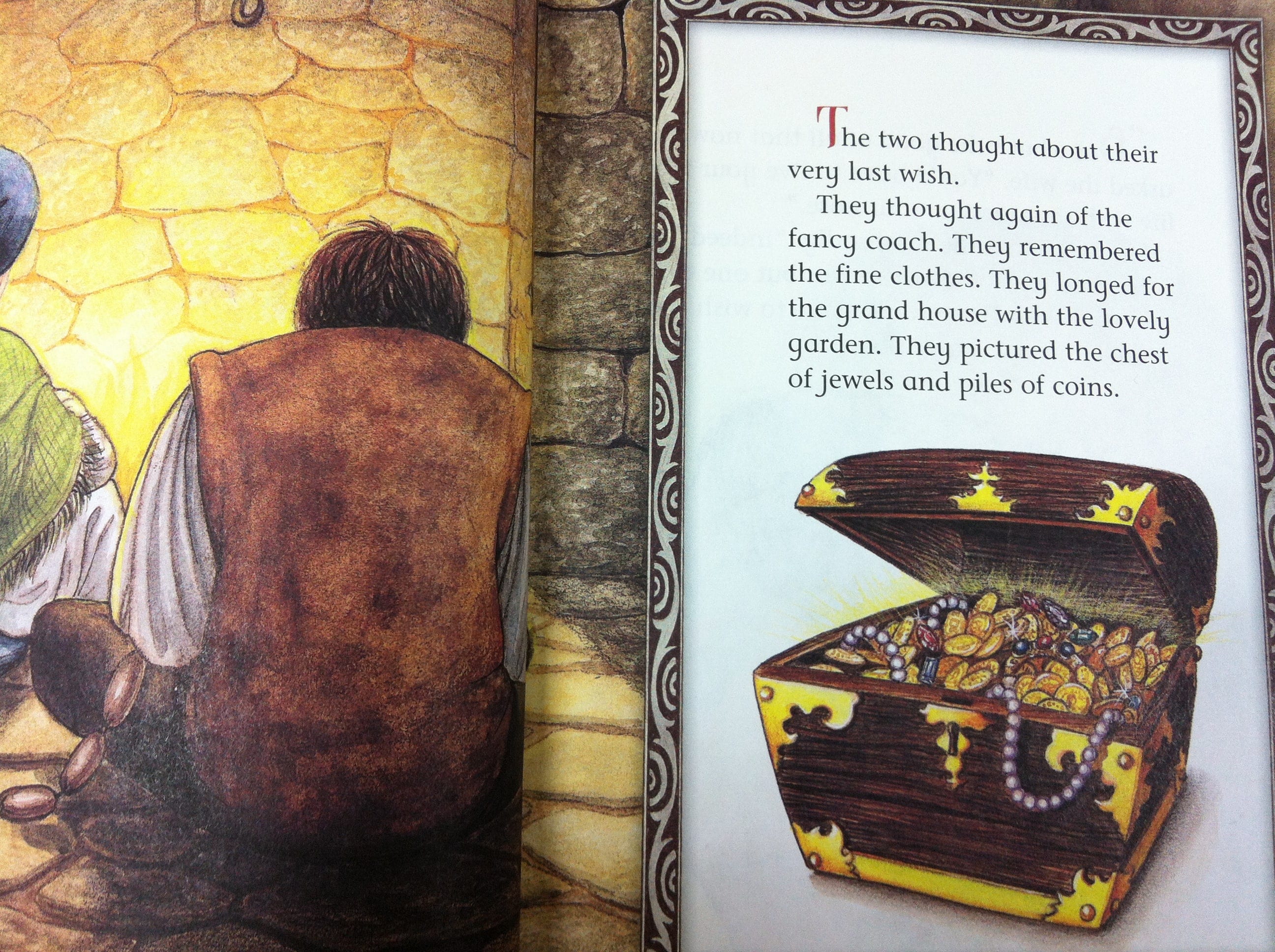
The two thought about their very last wish.
think about ~ 그리고 think of ~의 차이점은?
They thought again of the fancy coach. They remembered the fine clothes. They longed for the grand house with the lovely garden. They pictured the chest of jewels and piles of coins.
think of ~ as ~
Many have thought of you as the “great educator.”
remember, forget – forgot – forgotten
long for ~
picture (v., n.)
imagine (v.) – image (n.)
배울점은?
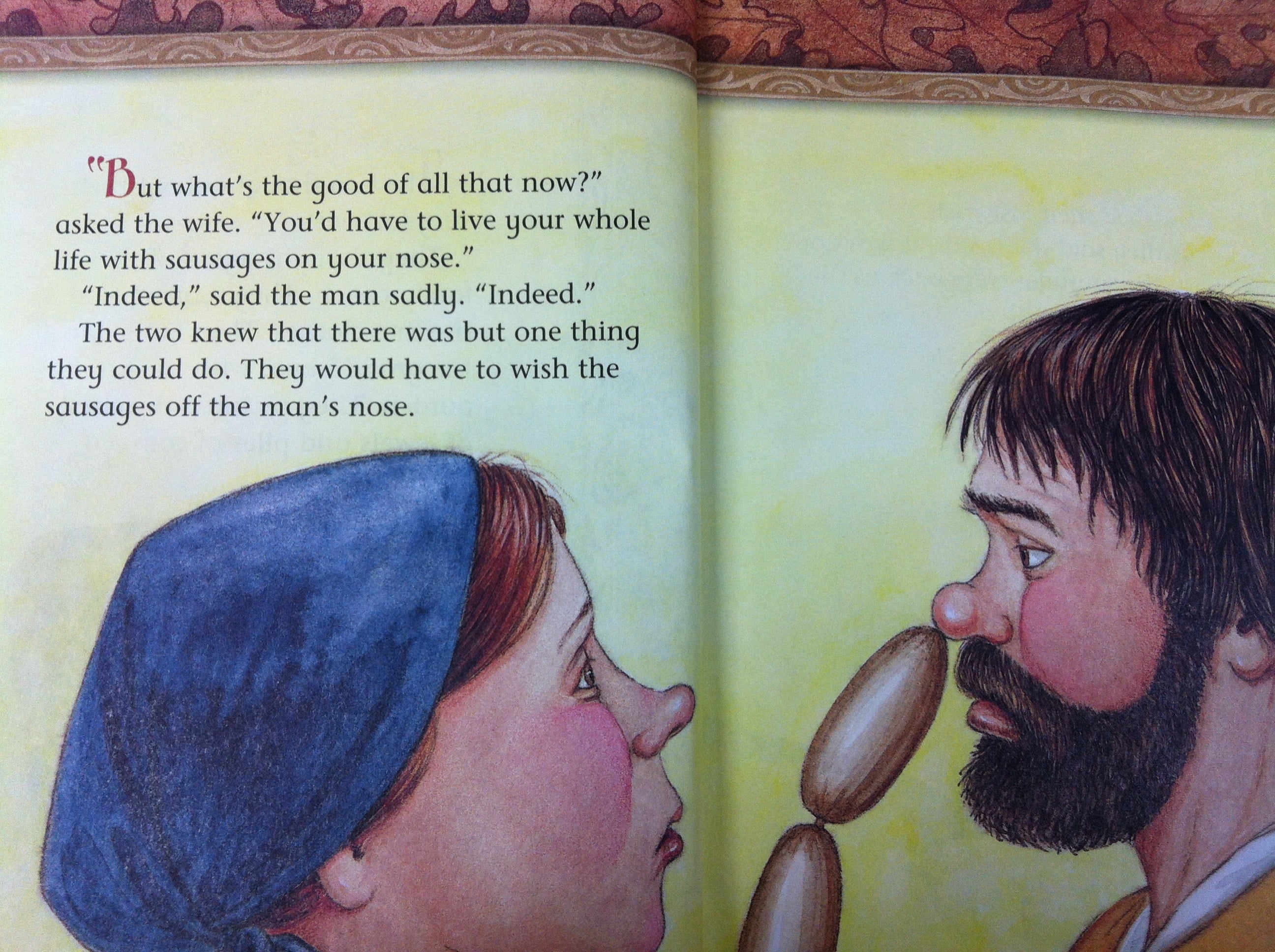
“But what’s the good of all that now?” asked the wife. “You’d have to live your whole life with sausages on your nose.”
“Indeed,” said the man sadly. “Indeed.”
The two knew that there was but one thing they could do. They would have to wish the sausages off the man’s nose.
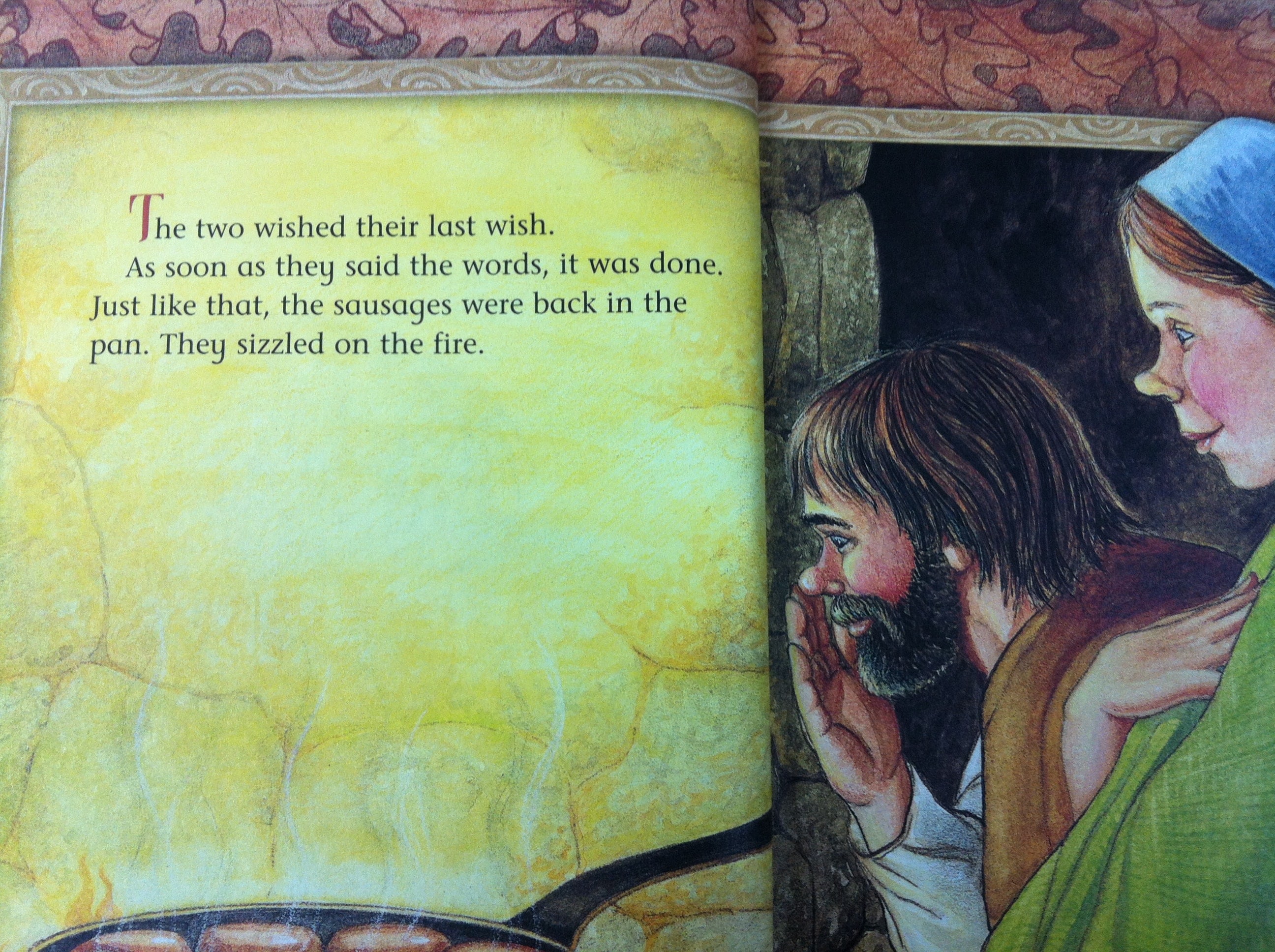
The two wished their last wish.
As soon as they said the words, it was done. Just like that, the sausages were back in the pan. They sizzled on the fire.
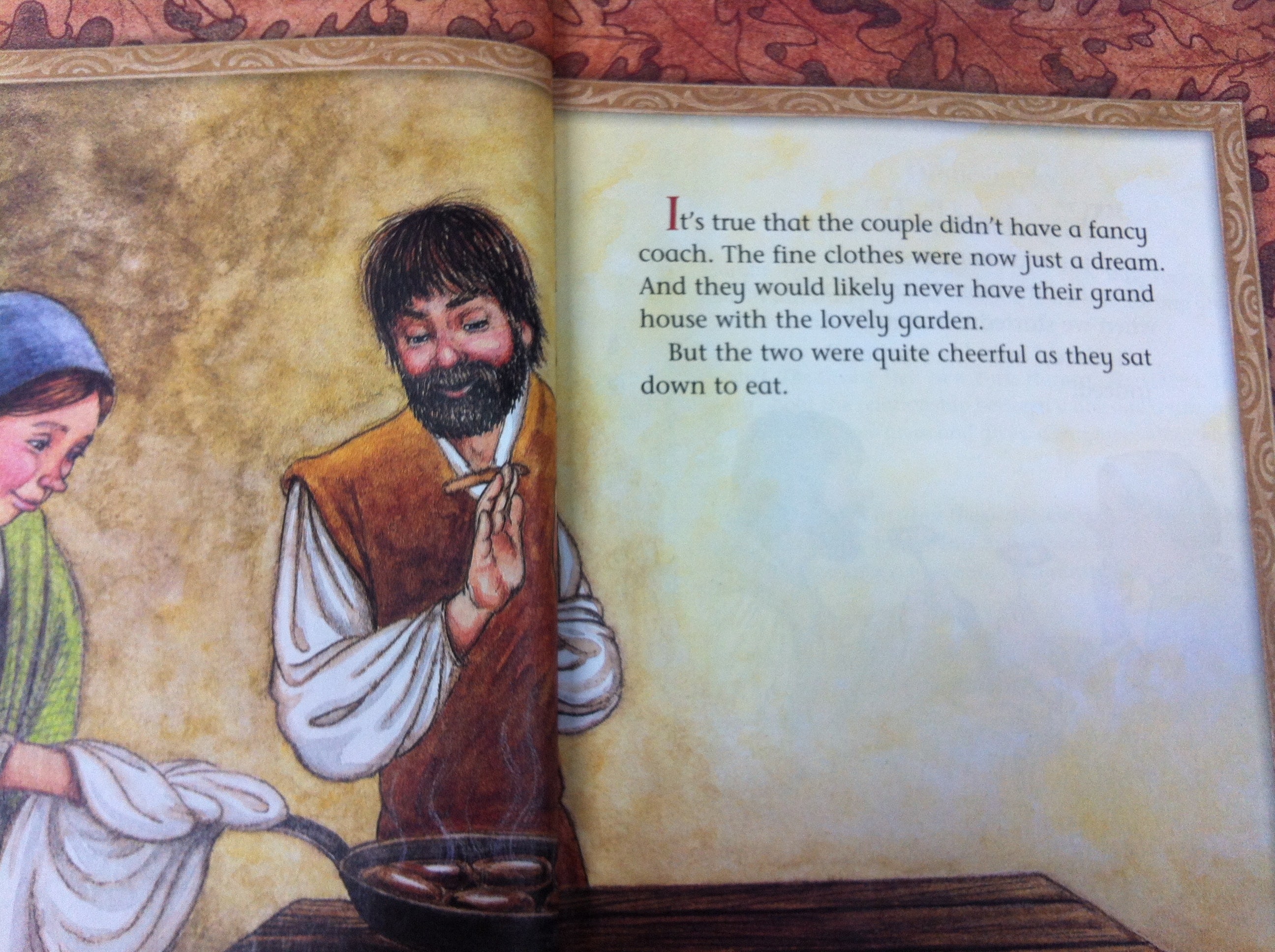
It’s true that the couple didn’t have a fancy coach. The fine clothes were now just a dream. And they would likely never have their grand house with the lovely garden.
But the two were quite cheerful as they sat down to eat.
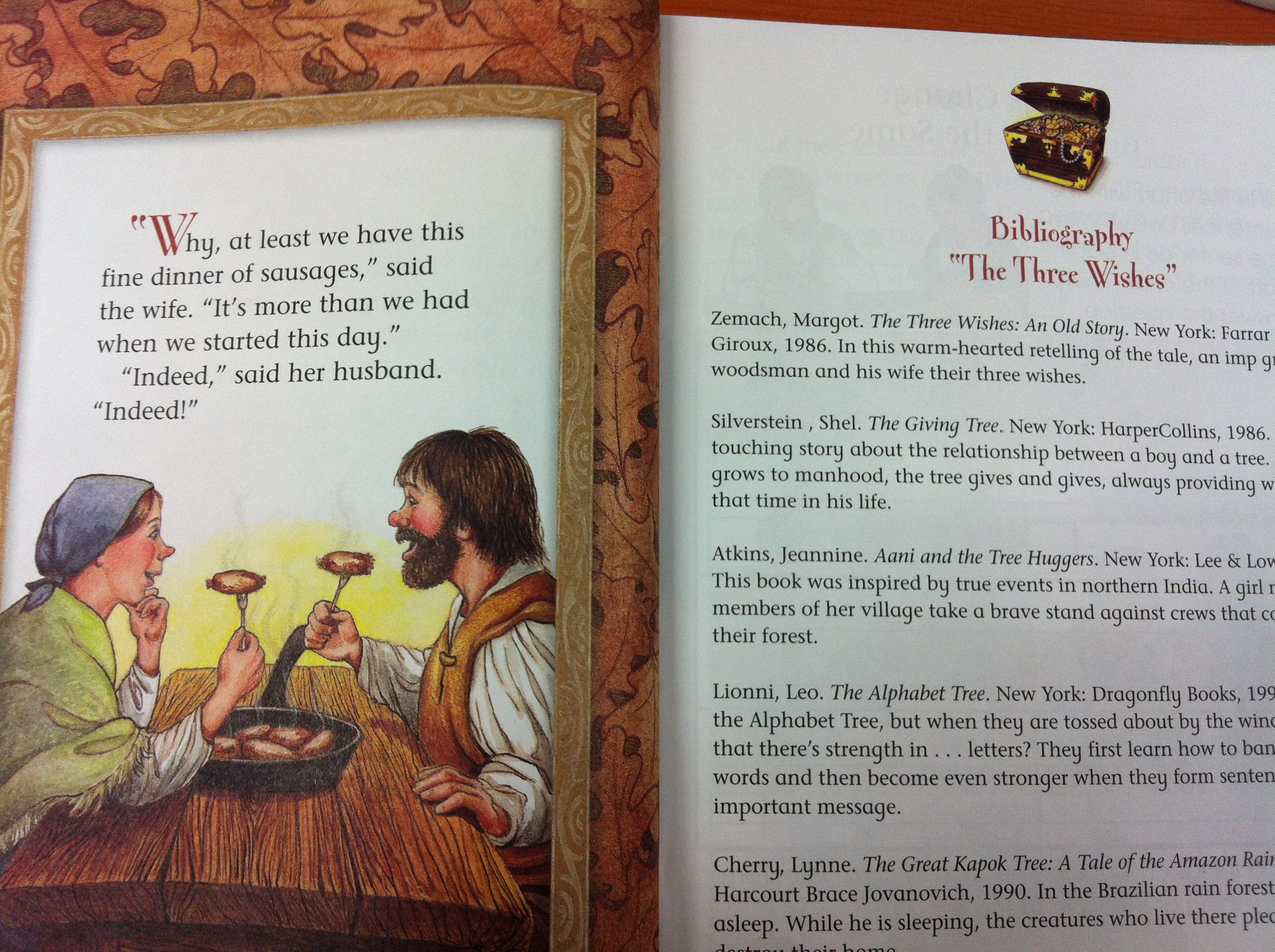
“Why, at least we have this fine dinner of sausages,” said the wife. “It’s more than we had when we started this day.”
“Indeed,” said her husband. “Indeed!”
